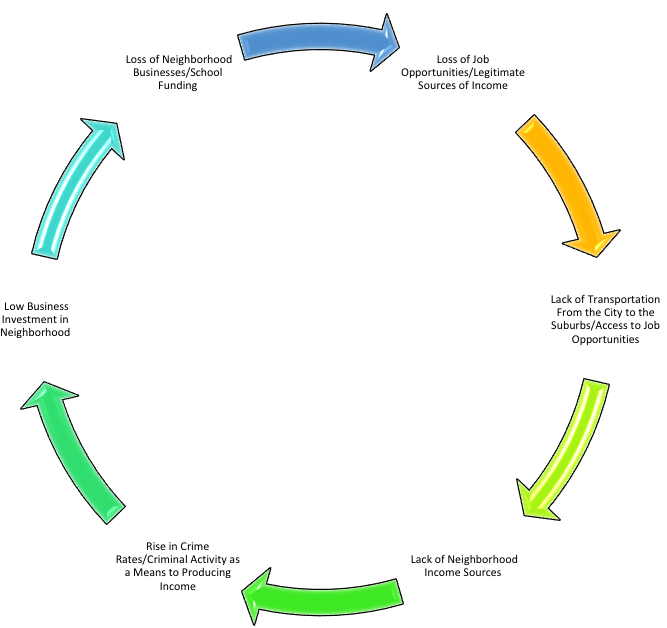It's no secret that neighborhoods with abundant economic resources and businesses have better schools, more job opportunities, less crime and thrive on government-funded developments. It's also no secret that you can find the poorly funded schools and closed businesses in urban neighborhoods with people of color.
Below, Brad Watkins, of Mid-South Peace and Justice Center, discusses the inequities that contribute to poverty in Memphis. These inequities began with the dismantling of public housing and the lack of transportation between low income areas to areas that are economically developed.
Watkins analyzes how white flight, of businesses from North and South Memphis where a majority of people of color live to predominantly white East Memphis, has detrimentally impacted those neighborhoods.
When
businesses move, so do
broader job opportunities, sources of income for families,
and funding to pay teachers and provide safe, quality schools
.
According to Richard Rosenfeld, a criminology professor at the University of Missouri-St. Louis, this shift unfortunately results in high crime rates for areas like North and South Memphis. "Impoverished neighborhoods that do not have the same resources as higher-income areas are more likely to be vulnerable to crime," Rosenfeld said. "And, the poor tend to more likely be victims of an assault."
(1)

In 1968, a week after the assassination of Dr. King, President Lyndon B. Johnson signed into law the Fair Housing Act of 1968 prohibiting discrimination of the sale, rental and financing of housing based on race, religion, national origin or sex.
(2)
This year marks the 50th Anniversary of the passing of the Fair Housing Act but, there are still "invisible l
ines," as Watkins mentioned, of segregation in housing. Low income communities are continuously losing businesses that aid in their sustainability. Banks are still using redlining in African American neighborhoods, declining mortgages in those communities. People are still being denied access to public housing for discriminatory reasons.
What's worse, in January, the Department of Housing and Urban Development rolled back enforcement provisions to enhance access to good schools, jobs, transportation and social services implemented by the Obama Administration. In April, HUD proposed new guidelines with work requirements for those receiving assistance that will likely triple the rent for those in low-income housing. This policy will affect those who need assistance the most, driving them deeper into poverty!(3)
What
policies remain in place
to
combat
housing segregation
?
What are we doing to revitalize and reconnect neighborhoods?
Organizations like the National Fair Housing Alliance are working to end housing discrimination and promote diverse, inclusive communities by providing information on where to report discrimination, resources for financial assistance and credit building. The Mid-South Peace and Justice Center fights for tenants in poor living conditions. There are organizations all over the country with these same goals in accessing housing. Our job is to join forces with them, spread the word about them, equip ourselves with the knowledge of our rights to fair housing and ultimately create change. Speak up, stand up and DO something! Find interesting information related to the housing crisis listed in our action items below.